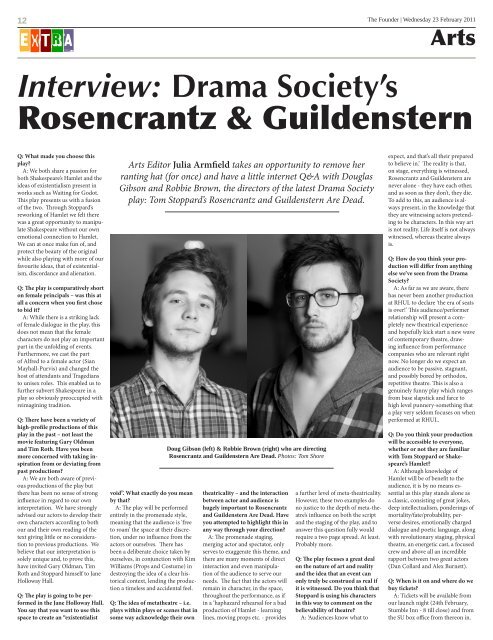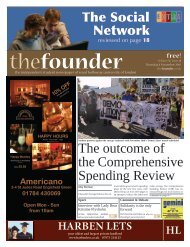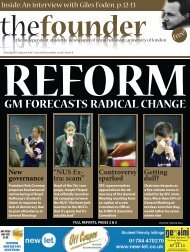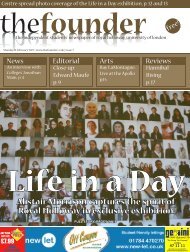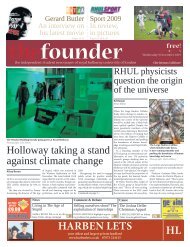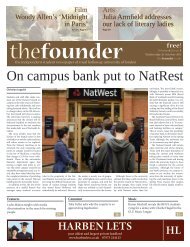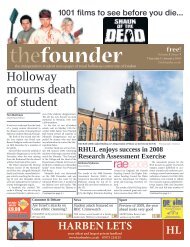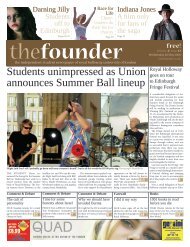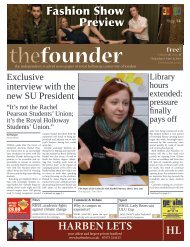Create successful ePaper yourself
Turn your PDF publications into a flip-book with our unique Google optimized e-Paper software.
12 <strong>The</strong> <strong>Founder</strong> | Wednesday 23 February 2011<br />
E X T R A<br />
Arts<br />
Interview: Drama Society’s<br />
Rosencrantz & Guildenstern<br />
Q: What made you choose this<br />
play?<br />
A: We both share a passion for<br />
both Shakespeare’s Hamlet and the<br />
ideas of existentialism present in<br />
works such as Waiting for Godot.<br />
This play presents us with a fusion<br />
of the two. Through Stoppard’s<br />
reworking of Hamlet we felt there<br />
was a great opportunity to manipulate<br />
Shakespeare without our own<br />
emotional connection to Hamlet.<br />
We can at once make fun of, and<br />
protect the beauty of the original<br />
while also playing with more of our<br />
favourite ideas, that of existentialism,<br />
discordance and alienation.<br />
Q: <strong>The</strong> play is comparatively short<br />
on female principals – was this at<br />
all a concern when you first chose<br />
to bid it?<br />
A: While there is a striking lack<br />
of female dialogue in the play, this<br />
does not mean that the female<br />
characters do not play an important<br />
part in the unfolding of events.<br />
Furthermore, we cast the part<br />
of Alfred to a female actor (Sian<br />
Mayhall-Purvis) and changed the<br />
host of attendants and Tragedians<br />
to unisex roles. This enabled us to<br />
further subvert Shakespeare in a<br />
play so obviously preoccupied with<br />
reimagining tradition.<br />
Q: <strong>The</strong>re have been a variety of<br />
high-profile productions of this<br />
play in the past – not least the<br />
movie featuring Gary Oldman<br />
and Tim Roth. Have you been<br />
more concerned with taking inspiration<br />
from or deviating from<br />
past productions?<br />
A: We are both aware of previous<br />
productions of the play but<br />
there has been no sense of strong<br />
influence in regard to our own<br />
interpretation. We have strongly<br />
advised our actors to develop their<br />
own characters according to both<br />
our and their own reading of the<br />
text giving little or no consideration<br />
to previous productions. We<br />
believe that our interpretation is<br />
solely unique and, to prove this,<br />
have invited Gary Oldman, Tim<br />
Roth and Stoppard himself to Jane<br />
Holloway Hall.<br />
Q: <strong>The</strong> play is going to be performed<br />
in the Jane Holloway Hall.<br />
You say that you want to use this<br />
space to create an “existentialist<br />
Arts Editor Julia Armfield takes an opportunity to remove her<br />
ranting hat (for once) and have a little internet Q&A with Douglas<br />
Gibson and Robbie Brown, the directors of the latest Drama Society<br />
play: Tom Stoppard’s Rosencrantz and Guildenstern Are Dead.<br />
void”. What exactly do you mean<br />
by that?<br />
A: <strong>The</strong> play will be performed<br />
entirely in the promenade style,<br />
meaning that the audience is ‘free<br />
to roam’ the space at their discretion,<br />
under no influence from the<br />
actors or ourselves. <strong>The</strong>re has<br />
been a deliberate choice taken by<br />
ourselves, in conjunction with Kim<br />
Williams (Props and Costume) in<br />
destroying the idea of a clear historical<br />
context, lending the production<br />
a timeless and accidental feel.<br />
Q: <strong>The</strong> idea of metatheatre – i.e.<br />
plays within plays or scenes that in<br />
some way acknowledge their own<br />
Doug Gibson (left) & Robbie Brown (right) who are directing<br />
Rosencrantz and Guildenstern Are Dead. Photos: Tom Shore<br />
theatricality – and the interaction<br />
between actor and audience is<br />
hugely important to Rosencrantz<br />
and Guildenstern Are Dead. Have<br />
you attempted to highlight this in<br />
any way through your direction?<br />
A: <strong>The</strong> promenade staging,<br />
merging actor and spectator, only<br />
serves to exaggerate this theme, and<br />
there are many moments of direct<br />
interaction and even manipulation<br />
of the audience to serve our<br />
needs. <strong>The</strong> fact that the actors will<br />
remain in character, in the space,<br />
throughout the performance, as if<br />
in a ‘haphazard rehearsal for a bad<br />
production of Hamlet - learning<br />
lines, moving props etc. - provides<br />
a further level of meta-theatricality.<br />
However, these two examples do<br />
no justice to the depth of meta-theatre’s<br />
influence on both the script<br />
and the staging of the play, and to<br />
answer this question fully would<br />
require a two page spread. At least.<br />
Probably more.<br />
Q: <strong>The</strong> play focuses a great deal<br />
on the nature of art and reality<br />
and the idea that an event can<br />
only truly be construed as real if<br />
it is witnessed. Do you think that<br />
Stoppard is using his characters<br />
in this way to comment on the<br />
believability of theatre?<br />
A: ‘Audiences know what to<br />
expect, and that’s all their prepared<br />
to believe in.’ <strong>The</strong> reality is that,<br />
on stage, everything is witnessed,<br />
Rosencrantz and Guildenstern are<br />
never alone - they have each other,<br />
and as soon as they don’t, they die.<br />
To add to this, an audience is always<br />
present, in the knowledge that<br />
they are witnessing actors pretending<br />
to be characters. In this way art<br />
is not reality. Life itself is not always<br />
witnessed, whereas theatre always<br />
is.<br />
Q: How do you think your production<br />
will differ from anything<br />
else we’ve seen from the Drama<br />
Society?<br />
A: As far as we are aware, there<br />
has never been another production<br />
at RHUL to declare ‘the era of seats<br />
is over!’ This audience/performer<br />
relationship will present a completely<br />
new theatrical experience<br />
and hopefully kick start a new wave<br />
of contemporary theatre, drawing<br />
influence from performance<br />
companies who are relevant right<br />
now. No longer do we expect an<br />
audience to be passive, stagnant,<br />
and possibly bored by orthodox,<br />
repetitive theatre. This is also a<br />
genuinely funny play which ranges<br />
from base slapstick and farce to<br />
high level punnery-something that<br />
a play very seldom focuses on when<br />
performed at RHUL.<br />
Q: Do you think your production<br />
will be accessible to everyone,<br />
whether or not they are familiar<br />
with Tom Stoppard or Shakespeare’s<br />
Hamlet?<br />
A: Although knowledge of<br />
Hamlet will be of benefit to the<br />
audience, it is by no means essential<br />
as this play stands alone as<br />
a classic, consisting of great jokes,<br />
deep intellectualism, ponderings of<br />
mortality/fate/probability, perverse<br />
desires, emotionally charged<br />
dialogue and poetic language, along<br />
with revolutionary staging, physical<br />
theatre, an energetic cast, a focused<br />
crew and above all an incredible<br />
rapport between two great actors<br />
(Dan Collard and Alex Burnett).<br />
Q: When is it on and where do we<br />
buy tickets?<br />
A: Tickets will be available from<br />
our launch night (24th February,<br />
Stumble Inn - 8 till close) and from<br />
the SU box office from thereon in.


